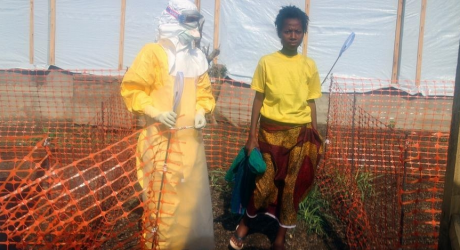As of 9 April, 157 people, including 101 deaths, have been infected with Ebola in Guinea. In Conakry, the capital city, efforts are now being intensified to further control the outbreak of this deadly virus. Efforts include the resources needed to track the people that may have been exposed to the virus.
The World Health Organization (WHO) has allocated additional resources and has conducted intensified trainings to streamline the coordination of the response. Response trainings have started in different departments within the Donka national teaching hospital and are expected to cascade to other district’s health facilities in the coming days.
The first group consisted of 70 trainees that will go into affected communities and follow up on persons who have had close contact with patients confirmed with the Ebola infection.
WHO clinicians also support Medecins Sans Frontieres (MSF) and the Ministry of Health. WHO reports to have more than 50 experts on the ground providing clinical management of patients, contact tracing, disease surveillance, laboratory work, logistics, as well as information-sharing and social mobilization and communication.
Experts report that Ebola can have a fatality rate of up to 90%, but a number of patients have now been discharged after successfully beating the viral disease.
“Today’s discharge of patients shows that Ebola is not always fatal. Good, early supportive care such as hydration, nutrition and appropriate medication can have a positive impact,” says Dr Tom Fletcher, Infectious Disease Physician at WHO, who provides clinical care to Ebola patients in Conakry.
Despite progress, support teams face significant challenges related to combating the outbreak – such as community relations. On-the-ground patient awareness teams have found it difficult to effectively translate an Ebola message into the local language, sometimes putting them in harms way.
According to MSF, “activities have been suspended following an incident where local people threw stones at buildings and vehicles, under the mistaken impression that the disease had been brought into the country by MSF. None of the MSF team was injured in the incident.”
“Of course we understand that the local population is concerned,” says MSF emergency coordinator Henry Gray. “We have seen similar reactions in other countries in the past. In these situations, ensuring that local populations have a good understanding of the disease and its associated risks is key”.
As with any outbreak, there are a lot of misconceptions, inaccurate information and fear. An example is in Ghana where the media reported on the death of a 12-year-old girl. But, Ghana’s Ministry of Health confirmed the death was from an unrelated acute febrile illness. Two suspected cases in Sierra Leone have also been excluded, as they have been laboratory confirmed as Lassa fever.
Misunderstandings are also common in regard to how Ebola is transmitted to humans. Ebola is not a vector-borne disease that is transmitted via the bites of insects or vectors such as mosquitos. It is transmitted to people from wild animals – primarily fruit bats – but also through the handling of infected chimpanzees, gorillas and monkeys.
Ebola spreads in the human population through human-to-human transmission via close contact of bodily fluids — blood, saliva, sweat — of people showing symptoms.
According to the WHO, initial symptoms of Ebola include the sudden onset of fever, intense weakness, muscle pain, headache and sore throat. These symptoms are followed by vomiting, diarrhoea, rash, impaired kidney and liver function, and in some cases, both internal and external bleeding such as bleeding from the ears.
As with other infectious diseases, one of the most important preventive measures for Ebola is frequent hand washing. Use soap and water, or use alcohol-based hand rubs containing at least 60% alcohol if soap and water are not readily available.
While precautions should be taken, health officials say there should be no reason to panic whatsoever. The World Health Organization, for instance, is not recommending any restriction to local or regional travel or trade.
Dr Couillard is an international health columnist that works in collaboration with the World Health Organization’s goals of disease prevention and control. Views do not necessarily reflect endorsement. (photo © Amandine Coline/MSF)
Facebook: Dr Cory Couillard
Twitter: DrCoryCouillard














